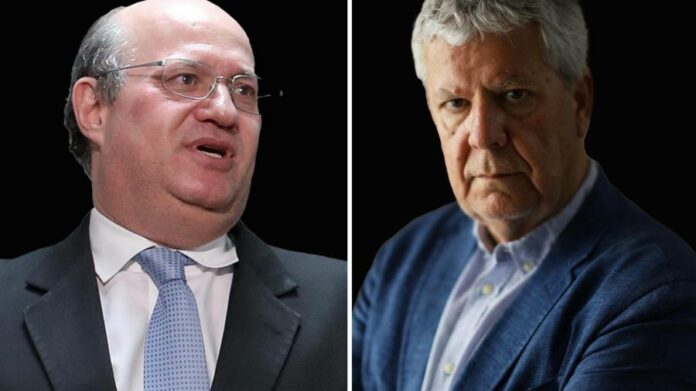Reeling from a decade of almost no growth and the devastation wrought by the pandemic on education and poverty levels, Latin America has arguably never needed its main development bank more.
Yet the first challenge awaiting the new president of the Inter-American Development Bank, who will be elected on Sunday by the lender’s 48 shareholder countries, will be to rebuild the organisation’s shattered morale following the dismissal of its previous leader.
Trump-era nominee Mauricio Claver-Carone was fired by the Washington-based bank’s governors in September. This followed an investigation which concluded he maintained a sexual relationship with a subordinate and rewarded her with pay rises totalling more than 45 per cent in under a year. Claver-Carone and the woman both denied the relationship.
Michael Shifter, senior fellow at the Inter-American Dialogue in Washington, noted that Latin America’s biggest development bank, which arranged funding of over $23bn last year, faced acute challenges. Food and energy insecurity risked aggravating already high levels of social discontent.
“The new IDB head will need to have a solid grasp of these problems and a clear idea how to address them,” he said. “But what is arguably even more important is a deft political touch that will be vital in mobilising support to secure a much-needed capital increase and in restoring integrity and equanimity to lift a shaken staff.”
Vying for the post are five candidates. Three come from the region’s largest economies, Brazil, Mexico and Argentina, while Chile and Trinidad and Tobago have also put forward nominees.
The bank’s biggest shareholder is the US. Since Washington holds 30 per cent of the voting power, American support is generally considered essential. The next biggest shareholders are Brazil and Argentina with 11.35 per cent each.
However, following the debacle over Claver-Carone — the first American to hold a post traditionally reserved for a Latin American — the US has been coy about its preferences. Officials have said that with no candidate of its own this time, Washington wants Latin America to unite behind a consensus choice.
Instead, the region’s main countries are competing head-on with each other. There is no clear favourite and very few countries are openly stating preferences ahead of Sunday’s election.
The two front-runners, according to those following the process, are Brazil’s Ilan Goldfajn and Chile’s Nicolás Eyzaguirre. A former head of Brazil’s central bank and respected economist, Goldfajn is currently on leave from his post as the IMF’s Western Hemisphere director to run for the IDB job.
As well as the immediate human resources challenges, “this needs to be an evidence and data-oriented bank, looking at when projects are effective,” Goldfajn told the Financial Times. “You need to look at the numbers. I like data, I like to look at the evidence.”
His top priorities are to use the bank’s firepower to address poverty, food insecurity, climate change and improve the region’s financial infrastructure.
Goldfajn would be Brazil’s first IDB president but his home country may yet snatch defeat from the jaws of victory. Key members of leftist president-elect Luiz Inácio Lula da Silva’s team have complained that Goldfajn was nominated by the outgoing hard-right government of Jair Bolsonaro and have asked for the IDB election to be postponed to allow Lula to nominate his own candidate — a request rejected by other countries.
Goldfajn is presenting himself as a technocratic, apolitical choice but a lack of support from his home government-to-be may hurt his chances.
Hoping to come through the middle is Chile’s Eyzaguirre. A former finance minister who has also served as the IMF’s Western Hemisphere chief and worked at the Chilean central bank, he has the experience for the role and is more aligned politically with the region’s incoming leftwing governments.
Like Goldfajn, Eyzaguirre stresses the need to improve morale at the bank and to improve the effectiveness of lending. “Chile is a country which has made huge progress in the last 40 years but which doesn’t use a lot of IDB resources,” he told the FT. “It’s an impartial trusted broker.” Eyzaguirre believes his experience of having held different ministerial positions in Chile is a good grounding for the negotiating and consensus-building needed at the IDB.
Mexico nominated the outgoing deputy governor of its central bank, Gerardo Esquivel. Esquivel is a respected technocrat and former academic but lacks the international experience and profile of his Brazilian and Chilean rivals. He may be disadvantaged by his nomination late in the day and by his relative lack of managerial experience. Esquivel did not respond to requests to discuss his candidacy.
Argentina’s Cecilia Todesca, international economic relations secretary at the foreign ministry, hopes to become the first woman to be IDB’s permanent president. Speaking to the Financial Times from Washington where she has been rallying support, Todesca said central to her plans is a programme to prioritise the “care economy”.
“Gender inequality is a big factor behind the lack of social development we see,” she said, “And the primary function of the bank is to assist in social development.”
Todesca would direct IDB funds to help improve reliable child and elderly care, so women can “reinsert themselves back into the workforce,” and establish better conditions for domestic workers. “Argentina decided to put a woman forward, that’s valuable for the region,” she added.
Also nominated is Trinidad and Tobago’s Gerard Johnson, a former head of the IDB’s Caribbean section who now works as a consultant to Jamaica’s government. The Caribbean has never had an IDB president but the region’s limited voting power makes this option unlikely. Efforts to reach Johnson were unsuccessful.
To secure the job, a candidate needs to win more than 50 per cent of the voting power of the 48 member states and a majority of at least 15 of the Western Hemisphere member states.







